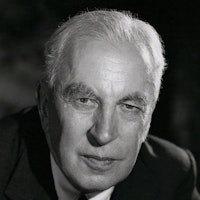Now who are the greatest benefactors of the living generation of mankind? I should say: Confucius and Lao-tse; the Buddha; the Prophets of Israel and Judah; Zoroaster; Jesus; and Muhammad; and Socrates.
Arnold J. Toynbee

The Greatest Benefactors
Topic: Interfaith Pathways
Now who are the individuals who are the greatest benefactors of the living generation of mankind? I should say: Confucius and Lao-tse; the Buddha; the Prophets of Israel and Judah; Zoroaster; Jesus; and Muhammad; and Socrates.
Arnold Joseph Toynbee, born on April 14, 1889, in London, was a British historian and philosopher of history. He studied at Balliol College, Oxford, and later served as a research professor of international history at the London School of Economics and the University of London. During the period from 1918 to 1950, Toynbee became a leading expert in international affairs, establishing his reputation in the academic world.
Toynbee is most renowned for his twelve-volume work, A Study of History, published between 1934 and 1961. In this extensive study, he analyzed the rise and fall of civilizations, seeking to identify patterns and cycles that could offer insights into the future of societies. His work was widely read and discussed, particularly in the 1940s and 1950s, making him one of the most influential historians of the 20th century. Despite some criticism, his ideas on civilizations have had a lasting impact on historical studies.
Throughout his life, Arnold Joseph Toynbee was a prolific writer and speaker, contributing significantly to discussions on history, culture, and international relations. He authored numerous books and articles, many of which were translated into multiple languages, reflecting his global influence. Toynbee passed away on October 22, 1975, leaving behind a legacy that continues to inspire and challenge scholars today.
Civilization on Trial
Toynbee, Arnold J. Civilization on Trial . Oxford University Press, New York, 1948, p. 156 [Arnold J. Toynbee, Civilization on Trial].

Arnold J. Toynbee
Theme: Interfaith Dialogue

About This Arnold Toynbee Quotation [Commentary]
Arnold Toynbee’s reflection on the greatest benefactors of humankind highlights the lasting influence of religious and philosophical figures in shaping our spiritual and moral world. By naming Confucius, Lao-tse, the Buddha, the Prophets of Israel and Judah, Zoroaster, Jesus, Muhammad, and Socrates, Toynbee acknowledges the broad impact these luminaries have had across cultures and centuries. Their teachings, though diverse, share a common goal of guiding society towards ethical living. Toynbee’s selection emphasizes how their insights continue to resonate in the lives of many today.
Toynbee’s identification of these figures as the “greatest benefactors” invites reflection on the power of wisdom and spirituality to foster unity among diverse communities. Each luminary, representing different religious and philosophical traditions, offers a unique perspective on the human condition and the path to transcendence. By highlighting these voices together, Toynbee suggests that the teachings of these figures possess a universal appeal that transcends time and place.
In focusing on these luminaries, Toynbee encourages appreciation for the diversity of human thought and the importance of cross-cultural understanding. His list calls for recognizing the shared values these figures represent, such as compassion, justice, and the pursuit of truth. In the context of interfaith dialogue, Toynbee’s words remind us that engaging with the wisdom of these diverse traditions can help find common ground and foster global solidarity. This approach reflects Toynbee’s broader view of history as shaped by the moral and spiritual evolution of humanity.
Huston Smith
Arnold Toynbee asks: “Now who are the individuals who are the greatest benefactors of the living generation of mankind? I should say: Confucius and Lao-tse; the Buddha; the Prophets of Israel and Judah; Zoroaster, Jesus, and Muhammad; and Socrates.” His answer should not surprise, for authentic religion is the clearest opening through which the inexhaustible energies of the cosmos enter human life. What then can rival its power to inspire life’s deepest creative centers? Moving outward from there through myth and rite, it provides the symbols that carry history forward, until at length its power is spent and life awaits a new redemption.
—Huston Smith [The World’s Religions (Harper San Francisco, 1991)] p. 9.
Related Quotes
Copyright © 2017 – 2025 LuminaryQuotes.com About Us